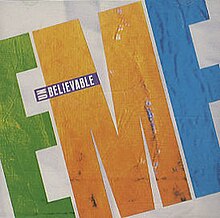
EMF are an English alternative rock band from Cinderford, Gloucestershire, who came to prominence at the beginning of the 1990s. During their initial eight-year run, from 1989 to 1997, the band released three studio albums before a hiatus. Their first single, "Unbelievable", reached number 3 on the UK Singles Chart, and was a number 1 hit on the US Billboard Hot 100 chart. Their debut album, Schubert Dip, went to number 3 on the UK Albums Chart. In April 2022, EMF released their first album of new material in 27 years, Go Go Sapiens.
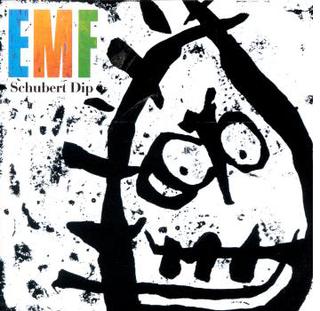
Schubert Dip is the debut album by British rock band EMF, released on Parlophone Records on 7 May 1991. It features the worldwide hit single "Unbelievable" which reached number one on the US Billboard Hot 100. The name of the album is a pun on the name of the popular sweet sherbet dip and the 19th-century composer Franz Schubert.
"Always on My Mind" is a ballad written by Wayne Carson, Johnny Christopher, and Mark James, first recorded by Brenda Lee and first released by Gwen McCrae in March 1972. Lee's version was released three months later in June 1972. The song has been a crossover hit, charting in both the country and western and pop categories. Elvis Presley's recording was the first commercially successful version of the song.

"Escapade" is a song by American singer Janet Jackson from her fourth studio album, Janet Jackson's Rhythm Nation 1814 (1989). It was written and produced by Jackson and Jimmy Jam and Terry Lewis. The song was released on January 8, 1990, by A&M Records as the third single from Janet Jackson's Rhythm Nation 1814 (1989). "Escapade" became the third of the historic seven top-five singles released from the Rhythm Nation 1814 album, reaching number one on the US Billboard Hot 100.

"Alright" is a song by American singer-songwriter Janet Jackson from her fourth studio album, Janet Jackson's Rhythm Nation 1814 (1989). Written by Jackson and Jimmy Jam & Terry Lewis, the song was released on March 4, 1990, by A&M Records as the fourth single from Janet Jackson's Rhythm Nation 1814. In the United Kingdom, it was issued as the album's fifth single in June 1990.

"Sadeness (Part I)" is a song by German musical project Enigma, released in October 1990 by Virgin Records as the lead single from their first album, MCMXC a.D. (1990). It became an international hit, reaching number one in 14 countries. In the United States, the song peaked at number five on the Billboard Hot 100 and number one on both the Dance Club Play and 12-inch Singles Sales charts. Its music video was directed by Michel Guimbard. A sequel to the song, "Sadeness (Part II)" featuring Anggun, was released on Enigma's eighth studio album, The Fall of a Rebel Angel (2016).
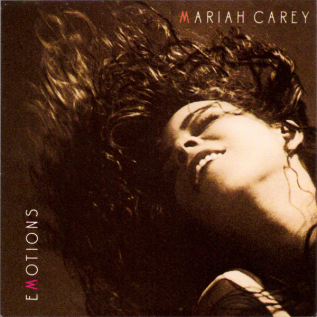
"Emotions" is a song recorded by American singer-songwriter Mariah Carey for her second studio album of the same name (1991). It was written and produced by Carey, Robert Clivillés, and David Cole of C+C Music Factory and released as the album's lead single on August 13, 1991 by Columbia Records. The song's lyrics has its protagonist going through a variety of emotions from high to low, up to the point where she declares, "You got me feeling emotions." Musically, it is a gospel and R&B song heavily influenced by 1970s disco music and showcases Carey's upper range and extensive use of the whistle register. Jeff Preiss directed the song's music video.
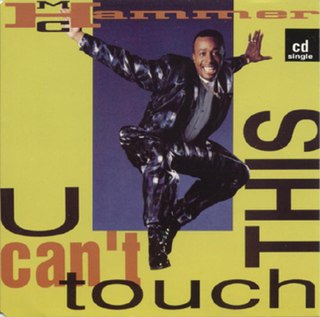
"U Can't Touch This" is a song co-written, produced, and performed by American rapper MC Hammer. It was released as the third single from his third album, Please Hammer Don't Hurt 'Em (1990), and has been considered his signature song. Along with Hammer, Rick James shares songwriting credits with Alonzo Miller, as the song samples the prominent opening riff of James' 1981 single "Super Freak". The song has been used and referred to in many television shows, films, commercials, and other forms of media. It has also received multiple awards and recognition.

"Groove Is in the Heart" is a song by American dance band Deee-Lite, released in August 1990 by Elektra as their debut and lead single from their first album, World Clique (1990). Written and produced by the band, it was a hit in many countries, reaching number-one in Australia and on both the Canadian RPM and US Billboard dance charts. Today it is widely recognized as a classic of its genre. It was accompanied with a psychedelic 60s-themed music video.

"Hot Stuff" is a song by American singer Donna Summer from her seventh studio album Bad Girls (1979), produced by English producer Pete Bellotte and Italian producer Giorgio Moroder and released as the lead single from Bad Girls in 1979 through Casablanca Records. Up to that point, Summer had mainly been associated with disco songs but this song also showed a significant rock direction, including a guitar solo by ex-Doobie Brother and Steely Dan guitarist Jeff "Skunk" Baxter. It is the second of four songs by Summer to reach number one on the Billboard Hot 100.

"How Am I Supposed to Live Without You" is a song co-written in 1982 by Doug James and Michael Bolton. The track was originally recorded by Laura Branigan in 1983, charting at number one in both the US and Canadian Adult Contemporary charts. Bolton later recorded his own version of the song that topped the US Billboard Hot 100 and became a worldwide hit.

"Play That Funky Music" is a song written by Rob Parissi and recorded by the band Wild Cherry. The single was the first released by the Cleveland-based Sweet City record label in April 1976 and distributed by Epic Records. The performers on the recording included lead singer Parissi, electric guitarist Bryan Bassett, bassist Allen Wentz, and drummer Ron Beitle, with session players Chuck Berginc, Jack Brndiar (trumpets), and Joe Eckert and Rick Singer (saxes) on the horn riff that runs throughout the song's verses. The single hit No. 1 on the Billboard Hot 100 on September 18, 1976; it was also No. 1 on the Billboard Hot Soul Singles chart. The single was certified platinum by the Recording Industry Association of America for shipments of over 2 million records and eventually sold 2.5 million in the United States alone.

"Watching the Wheels" is a single by John Lennon released posthumously in 1981, after his murder. The B-side features Yoko Ono's "Yes, I'm Your Angel." It was the third and final single released from Lennon and Ono's album Double Fantasy, and reached No. 10 in the US on the Billboard Hot 100 and No. 7 on Cashbox's Top 100. It peaked at number 30 in the UK.

"The Power" is a song by German Eurodance group Snap!, released as their debut single. It was released on 3 January 1990 as the lead single from their debut studio album, World Power (1990). The song reached number one in Greece, the Netherlands, Spain, Switzerland, the UK and Zimbabwe, as well as on the US Billboard Hot Dance Club Play and Hot Rap charts. On the Billboard Hot 100, "The Power" managed to reach number two for one week.
Ian Alec Harvey Dench is an English songwriter and musician. He is the guitarist and principal songwriter for EMF, who scored a major international hit reaching number 1 in the United States with "Unbelievable" in 1991. It was voted one of BBC Radio 2's 'Greatest Guitar Riffs'.
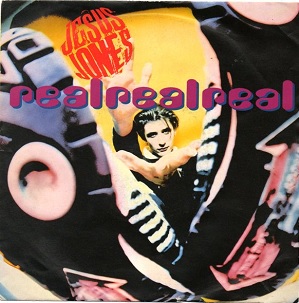
"Real Real Real" is a song by UK band Jesus Jones from their second album, Doubt (1991). It was released in March 1990 as the first single from Doubt, just prior to the release of the album. "Real Real Real" peaked at No. 19 on the UK Singles Chart and became the band's second top-10 US hit, peaking at No. 4 on the Billboard Hot 100 in 1991.

"I Believe" is a song by British band EMF, released as the second single from their first album, Schubert Dip (1991). The song was released as a single in January 1991 in the UK following their big hit "Unbelievable". The song reached number six on the UK Singles Chart. In the US, the song was the band's third single, reaching number 10 on the US Billboard Modern Rock Tracks chart. The accompanying music video received heavy rotation on MTV Europe.

"Strike It Up" is a song by Italian music group Black Box. It was the fifth single from their debut studio album, Dreamland (1990), and was released on 6 February 1991 in many countries worldwide. The single was a success on many charts, including the Billboard Hot 100 in the United States, where it peaked at number eight. It also topped the Billboard Dance Club Songs chart in June 1991 for one week. In the United Kingdom, it peaked at number 16 on the UK Singles Chart. "Strike It Up" also was a top-10 hit in Denmark, Greece, Ireland, and the Netherlands. And on the Eurochart Hot 100, the track reached number 38.

"Pray" is a song released in August 1990 by Capitol as the third single from American rapper and dancer MC Hammer's third album, Please Hammer Don't Hurt 'Em (1990). Produced by Hammer, the song heavily samples Prince's 1984 song "When Doves Cry", the first of just a few times that Prince allowed samples of his compositions. The track also interpolates Faith No More's "We Care a Lot". The word "pray" is mentioned 147 times during the song, setting the record for the number of times a song title is repeated in an American Top 40 hit.
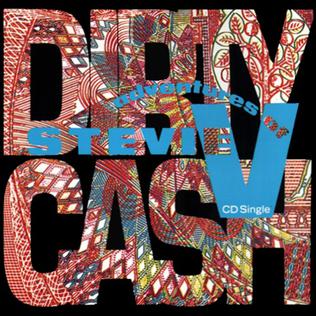
"Dirty Cash (Money Talks)" is a song by British dance music act the Adventures of Stevie V. It was first released in December 1989 on the Mercury record label, then again in 1990 both on 7-inch vinyl. The 1990 release peaked at number two on the UK Singles Chart, number one in the Netherlands, and topped the US and Canadian dance charts. The song features vocals by Melody Washington, a music teacher from Georgia living in England and teaching for the US Air Force, who met Stevie V. while she was playing in a local club near his home. Mick Walsh and Stevie V composed the track.
